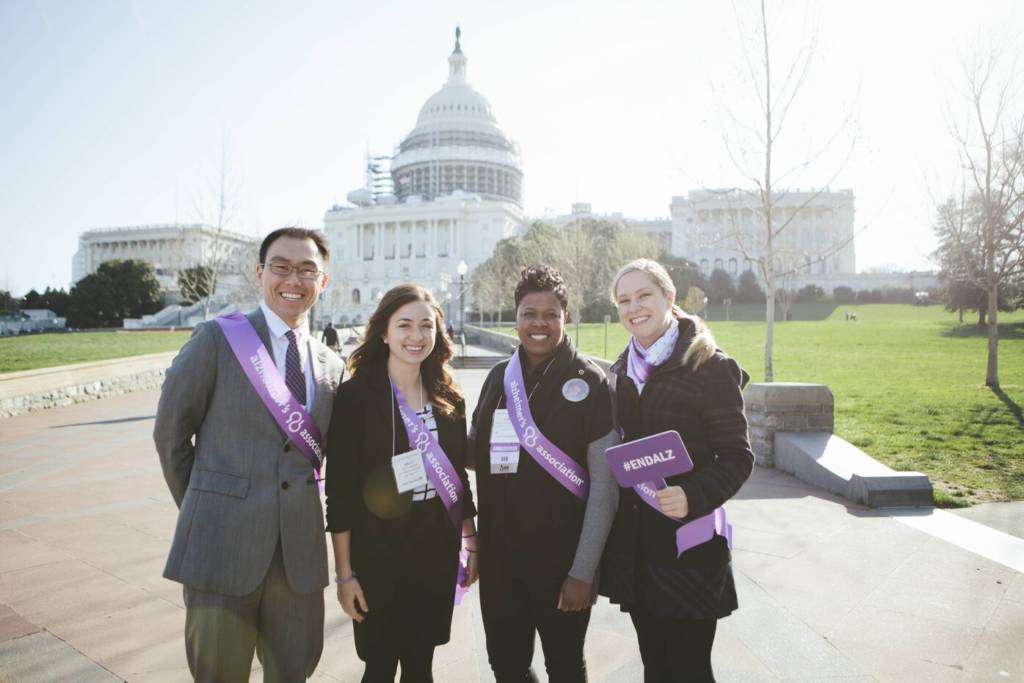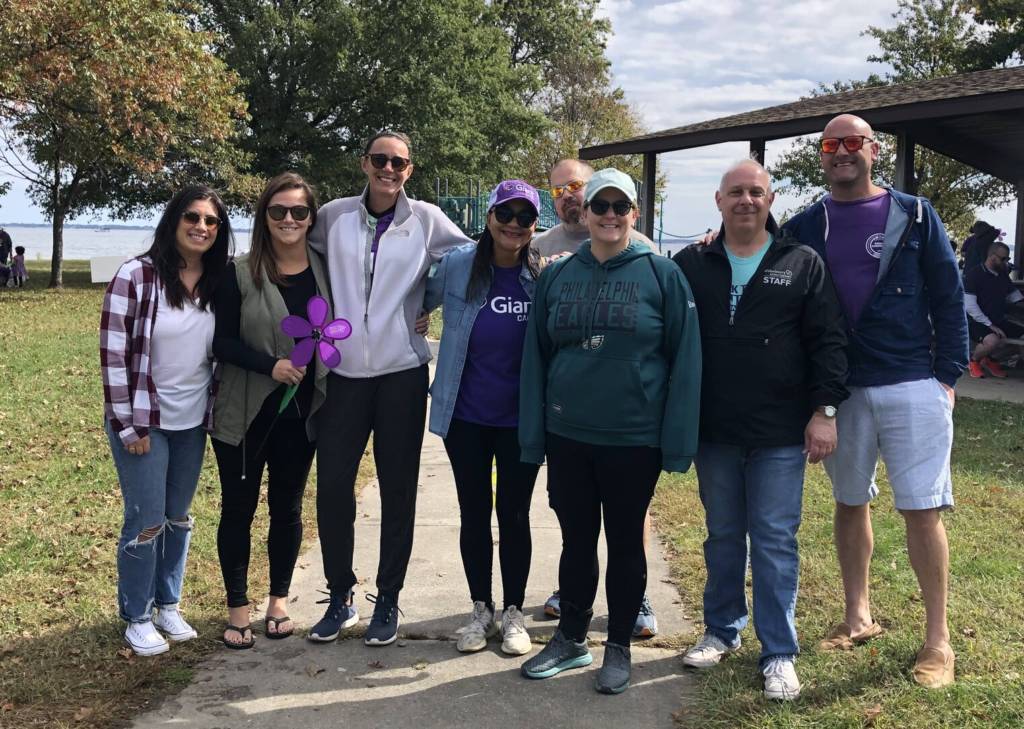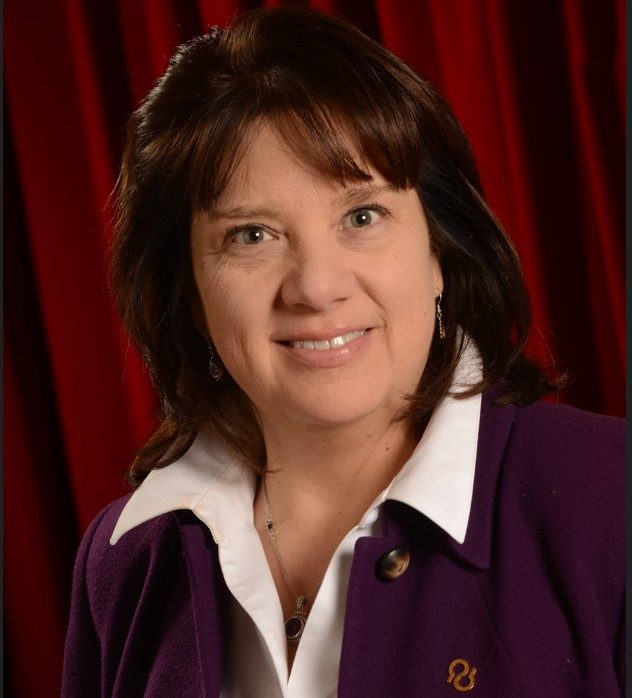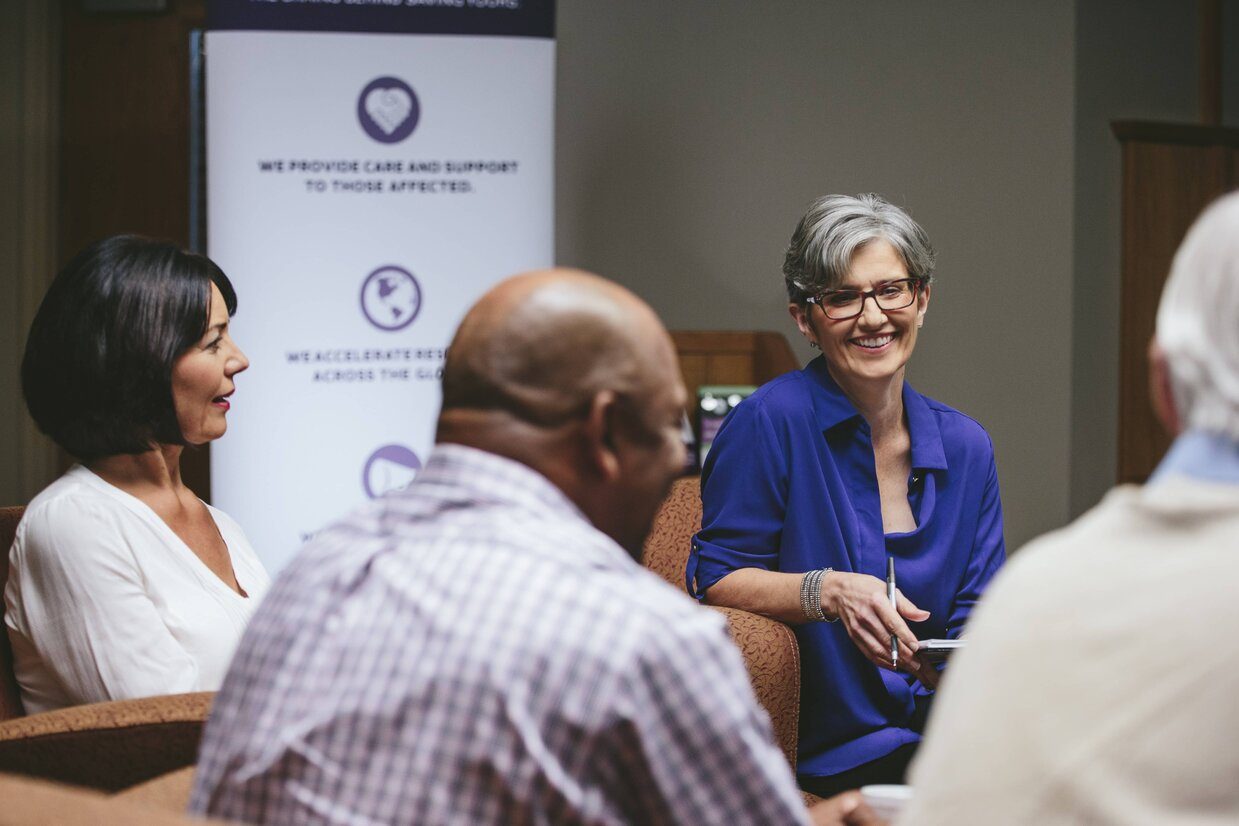The Alzheimer’s Association may be best known for its advocacy, but Ellen Torres of the Greater Maryland Chapter stresses the support provided by its 24/7 helpline for people living with Alzheimer’s or dementia, their caregivers and professionals. Anyone can call, and someone is always at the other end. Giant Food has supported this nonprofit organization through its Bloomin’ 4 Good and Community Bag Programs.
Tell us about Alzheimer’s Association Greater Maryland Chapter.
The Alzheimer’s Association in Greater Maryland was founded in 1980 by a group of volunteers working with top Johns Hopkins doctors. At the time, there was very little information about dementia; senility is frequently what they called it. They saw this incredible burden on caregivers, but there was no information or support; the doctors felt like the families needed something. So, they pulled together a group of volunteers who created an organization around providing support for caregivers for those living with Alzheimer’s and dementia issues.
About a year or so later, there was a movement across the nation led by Jerome Stone, who also found, when caring for his wife, who had Alzheimer’s, that there was nothing available. He was a businessman in Chicago with access to a medical library at one of the universities, and he saw that available information about Alzheimer’s all fit on one page. So, he started a national effort, and folks here locally decided that coordinating with some like organizations across the country would lead to being better together, which it did. And the Alzheimer’s and Related Disorders Association (known as the Alzheimer’s Association) was founded as a series of chapters across the country. The Greater Maryland chapter hired its first employee in 1986. In 2016, we merged with all the chapters across the country to create one national organization. Now we are a chapter office of the greater organization.
Our mission is twofold: providing care and support for those living with the disease and their caregivers while researching a treatment, prevention and a cure. We also advocate for those living with this disease. We have this huge body of volunteers who lend their voices and tell their stories to their elected officials to say, “We need more research dollars. We need to put more research into this disease.”
It is the most expensive disease that our country is facing. As the aging population continues to grow, Alzheimer’s is going to hit many more people, and it is going to devastate the finances of the country. Our advocacy effort for research dollars is working. In 2014, we had about $586 million in research, and now because of our tremendous advocacy efforts, we are at $3.5 billion for research.

Through our advocacy for Alzheimer’s, we’ve been able to make people understand there’s much more money going into cancer, diabetes, heart disease and HIV than Alzheimer’s, and of course, we need that. As a result, we’re seeing a drop in the number of people dying from these diseases. They’re living longer. But there’s this trajectory that if we don’t have some treatment or prevention, there will be 6 million individuals living with some form of dementia soon. And that number could go to 15 million by 2050.
The Alzheimer’s Association is working on all those fronts to create awareness for this disease. In the 1940s and ’50s, people would not talk about having cancer; a stigma was attached to it. But now, that stigma does not exist anymore. Cancer is now something that people rally around. But we are still in that stage where people are afraid to talk about Alzheimer’s or dementia; that stigma still exists for this disease.
The doctors still don’t know enough about it, and there is no treatment. We work as an organization to educate the medical community to acknowledge that a person diagnosed with dementia can have a meaningful life during the time they still have if you put supports around them and their family. You can make this journey a lot less difficult.
There are ways to prevent and reduce your risk. We offer a lot of free educational seminars to people, including knowing the 10 warning signs of Alzheimer’s and what you can do to reduce your risk. We know that the heart and the brain go hand in hand. If you are monitoring and keeping good heart health, lowering your blood pressure, lowering your cholesterol, eating a heart healthy diet, exercise, those kinds of things that are critical to your heart health, they’re also critical to your brain health, including not smoking, not excessively drinking.
Things that are more in tune with the brain, like remaining social and learning new things, can also reduce your risk. Yes, crossword puzzles are good for your brain, but learning something new is more important.
What sets your organization apart from other nonprofits in the community?
The Alzheimer’s Association is the largest nonprofit funder of research and the third largest overall in the world after the United States and Chinese governments. So that’s one of the things that sets us apart. But in addition to the research, we provide services for every day.
The most important service that we offer is a 24/7/365 helpline. It’s a service provided for people living with Alzheimer’s or dementia, their caregivers and professionals; anyone can call. There will always be somebody on the other end of that phone helpline, and that is 1-800-272-3900.
For instance, we recently had an employer concerned about an employee with memory issues and wanted more information about understanding what was going on and how to approach this with the employee.
For caregivers, it’s a tough job. It is 24 hours a day. As somebody progresses in the disease, you’ll often hear the term “sundowning,” meaning that the person is not sleeping well and is up all night, trying to go to work at 3:00 am. Forget the fact that they retired 20 years ago!
Sometimes the helpline is for practical advice. Sometimes the helpline is for referrals. For example, what can we do to keep mom safely in her home now? So, there could be talks about home healthcare. There could be talks about bringing in companion care. There could also be that difficult conversation that she now needs 24/7 care. Is it time for assisted living or memory care?
I had a spouse involved with a Walk to End Alzheimer’s. They had a family team, and when they registered, the family raised a lot of money in a very short amount of time. I looked at their walk page and realized that they were a family with the husband/father who was going through the early stages of Alzheimer’s. So, the first thing I did was call to make sure she knew what we could do for them. We have support groups; we have care consultations; we can walk you through a plan for what you need to know for the next few months.
And the question she asked me, which has always stuck with me, was, “Is there somebody on the other end of that phone who can tell me how not to cry every day?” And the answer is, “Yes, there is.” And so those are the kinds of services that caregivers and those living with the disease need, and that’s what we provide.
And it’s all provided free of charge to everyone. And it is provided because of the generosity of our donors through our fundraising events and the efforts of a tremendous number of volunteers.
The most important service that we offer is a 24/7/365 helpline. It’s a service provided for people living with Alzheimer’s or dementia, their caregivers and professionals; anyone can call.
Tell us a story that illustrates the good work of your organization.
In the development function, I meet a lot of families, and I had an opportunity to do a lunch-and-learn and education seminar at a company. One of the things that we do in this education is to go through the 10 warning signs of the disease. I had gotten through a couple of them, and I saw right away that a woman was crying in front of me. And there was another woman on the other side who was crying.
So, I stopped to talk with them because it was apparent they were living with this. And one woman said that her husband had Lewy body dementia and was in his fifties. And the other woman, who looked like she might have been in her mid-twenties, had just lost her dad. Then I learned there were two other gentlemen in the group who were caring for their mothers.
As it turned out, the woman whose husband had Alzheimer’s was participating in one of our walks with him that very Saturday. She and her husband came surrounded by their friends, and this was the first time they had ever been to a walk. And at the walk, they saw a whole lot of other caregivers, partners and family members surrounding the person they love.
Her husband, Chuck, looked at me and asked, “Is all of this for me? Wow!” And I said, “Yes, Chuck, we’re all here for you.” He died in 2019, and I have remained close to his wife. When I went to the funeral, you heard about and saw the man he was before the disease took away his memory, took away his presence, his essence. Still, it didn’t take away the core of who this man was. And he had a beautiful life. He had wonderful children. He had a life that he lived to the fullest. I’m just so sorry that we have not yet found a way to cure this disease but knowing that we do everything we can every day to lead us to that inspires me every day to do the job. Whether it’s Chuck or any of the other amazing, courageous people I’ve met and some of the most dedicated and passionate caregivers, that’s what our work is all about.

What is your most outstanding achievement or contribution to the community?
What bothers us more than anything, and we hear it far too often, is that people do not know we’re here to help them. When I’m out in the community, somebody will immediately come up and say, “I lost my mom,” or “I lost my dad,” or “I lost my grandma.” Or they may be currently living with Alzheimer’s. And one of the questions we ask is, “Did you know that we were here to help you?” And the answer is most often “No.” Over the last few years, we have focused on making sure people know we are here to help and also that physicians are aware they can send their patients to us for support.
But then we find someone who says, “Oh, yes! The helpline was a savior, and the support group, too. I got more help and support from those people than my family because they understood.” Then I know we’ve done something right. Until we can say that every single person who’s living with this disease knows to come for help, we’ll keep working at it. Still, we are very proud when we find somebody who says, “Yes, I got the message.” Here in Maryland, we were founded for that very reason, to provide that support, and it is fundamental to the work that we do and is available 24/7.
Until we can say that every single person who’s living with this disease knows to come for help, we’ll keep working at it.
What do you want people to know about Alzheimer’s Association Greater Maryland Chapter?
Please join us! Please join us in some way, whether to access the services we can provide or to lend your voice to the cause. Join us to lend your support as a volunteer. We have a very small staff, and we work tirelessly in the community, but we can only accomplish what we accomplish because of dedicated volunteers. And there is a role for everyone, and we will find the right one for you. Join us to help with this effort to bring awareness everywhere and to everyone.
How will you use the funds raised from the Giant Food Bloomin’ 4 Good and Community Bag Programs?
Can we say how much we love Giant Food? Giant is a true supporter and has been a tremendous partner for more than 20 years. And we are so honored by their partnership and their relationship.
The money we raise through the Bloomin’ 4 Good and Community Bag Programs and all the other initiatives we do with Giant help fund our work every day. That includes local support and caregiver support, as well as our research and our national efforts.
Is there anything you would like to add?
I want to reiterate our helpline is available 24/7/365 at 1-800-272-3900. Here, you will be connected to everything that we do.

Published November 16, 2022.

